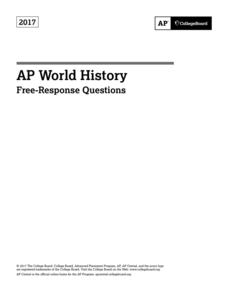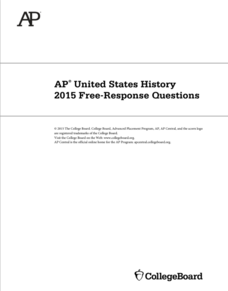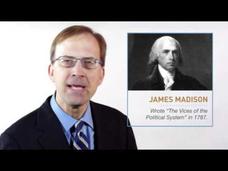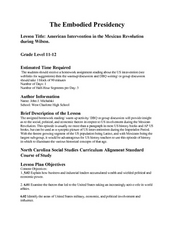Curated OER
2001 AP® United States History Free-Response Questions
Rigorous and challenging, the AP Test for AP United States History contains a document-based question (with nine documents), as well as two additional free-response questions. Students who are preparing for the test will appreciate the...
College Board
AP United States History Practice Exam
Looking for a practice set for the AP United States History exam? The packet for the 2015 exam provides just such an opportunity. Included in the resource are the same instructions, question types, and timing guides used in the May...
College Board
2018 AP® United States History Free-Response Questions
Learners explore the the Age of Imperialism using primary sources and an authentic College Board documents-based question. Other prompts explore the economic changes brought about by the American Civil War, technology, mercantilism, and...
College Board
2016 AP® United States History Free-Response Questions
The British and Spanish both had footholds in the New World, yet they had different approaches. Scholars explore the dynamics, along with the reasons behind immigration to the United States and business practices of the Gilded Age in a...
National Endowment for the Humanities
Lesson 1: The United States Confronts Great Britain, 1793–1796
After the Revolutionary War, the success of the United States was far from guaranteed. Foreign powers coveted the new land, and Great Britain challenged American sovereignty. Learners consider the challenges facing the new nation using...
College Board
2017 AP® United States History Free-Response Questions
Were unfair taxes really the cause of the American Revolution? Learners explore the complicated historiography behind the revolutionary period using authentic College Board prompts. The free-response questions from the exam feature...
College Board
2015 AP® United States History Free-Response Questions
How do preservationists and conservationists differ? How did the Founding Fathers come to understand the American Revolution? Learners explore the queries and more using authentic College Board materials to prep for upcoming exams.
Bill of Rights Institute
Interstate Commerce and the Constitution
Who had power over trade in the early days of the United States? Who has power now? Viewers investigate the Commerce Clause of the United States Constitution. Using an AP Exam review video, learners examine issues surrounding authority...
James Madison Memorial Fellowship Foundation
Those "Other Rights:" The Constitution and Slavery
Did the United States Constitution uphold the institution of slavery, or did it help to destroy it? Young historians study Article 4, Section 2, Clause 3 of the Constitution and evaluate the rights of slaveowners as they compared to...
Curated OER
Demonstrating an Understanding the Evolution of Democracy in the United States
Learners explore how democracy in the United States changed and evolved from its birth to the present. They participate in a mock testing environment. Students write a multi-tasked essay on American government and politics.
swmcdn
AP US History Test Review
Every major concept, key term, and definition that an AP US history student should know for a test prep session and the big exam is right here in this comprehensive, well-organized study guide.
Curated OER
Lesson 1: English-Indian Encounters
What did the English settlers think of the Native Americans inhabiting the Chesapeake region of the United States? Learners analyze a series of documents and images to determine the English perception of the local inhabitants. A great...
National Constitution Center
Voting Rights since the Fifteenth Amendment
What does it mean to have the right to vote? To what extent have interpretations of the Fifteenth Amendment changed over time? Young historians examine and analyze primary source documents, an interactive website, and historical analysis...
Bill of Rights Institute
Post-WWII Boom: Transition to a Consumer Economy
The war is over! Scholars investigate an AP review video to uncover the post-WWII era in the United States. Viewers examine and analyze the consumerism that arose in post-war America. This is the eighth installment of a nine-part...
Alabama Department of Archives and History
Conflict in Alabama in the 1830s: Native Americans, Settlers, and Government
To better understand the Indian Removal Act of 1830, class members examine primary source documents including letters written by Alabama governors and the Cherokee chiefs. The activity is part of a unit on the expansion of the United...
Polk Country Schools
The Death of Abraham Lincoln DBQ
The assassination of Abraham Lincoln was a pivotal moment in American history, but what were the immediate effects throughout the newly unified country? A document-based question focuses on the consequences of the first...
Polk County Public Schools
The Blame Game for the Loss at Pearl Harbor
Known as the day that will live in infamy, the attack on Pearl Harbor in 1941 was a shock to all. But why was the United States unprepared on that December morning? Study a series of primary sources in a document-based question that...
Curated OER
The Embodied Presidency Wilson
Students take a closer look at U.S. intervention in Mexico. In this 20th century history lesson, students examine primary documents to consider why the United States entered the Mexican War and then write DBQ essays on the topic.
Curated OER
America 2000: Federal Round Table Discussion
Eighth graders examine the United States Constitution and identify the beliefs and values Americans follow today. In groups, they compare and contrast state's rights and federal rights and the issues affecting them. They debate the...
Bill of Rights Institute
Economics of the North and South Before the Civil War
How did economic issues lead to war? Viewers watch an AP review video to examine one of the main causes of the American Civil War, the Tariff of Abominations. They examine the issues concerning the economies of the North and South prior...
Ford's Theatre
A Comparison of Lincoln’s Inaugural Addresses
Speech, speech! Analyzing speeches is no easy task. High schoolers learn the important process of annotation as they work together to analyze Lincoln's inaugural address. Then groups of four work to annotate a second speech at a more...
Bill of Rights Institute
America's Transition to a Global Economy (1960s-1990s)
Just how do we live in a global society? Scholars investigate an AP review video to see the transition in the latter half of the 20th century to a global economy. The final video of nine installments helps them examine and analyze the...
The Alamo
A Teacher’s Guide to Sam Houston
Need a teacher's guide all about Sam Houston and how he relates to the Texas Revolution? Look no further! The guide includes a timeline detailing Houston's life, important milestones, and relevant maps that include his movement around...
Bill of Rights Institute
Progressivism and The New Deal
Bust those trusts! Scholars investigate the Progressive Era leading to the New Deal in America. They examine the impact legislation had on attempting to control big business in the United States. Are there any parallels to today?

























